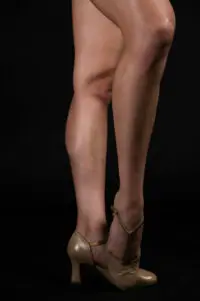Suite 3, Ground Floor, The Gateway,
312 St Kilda Road, Southbank, VIC, 3006
Whats Calves Got To Do With It?

Calf Strength, Performance, Care and Recovery
As physios we often talk to our clients about the importance of having good baseline calf strength and endurance. This applies to everyone who is on their feet but is especially important for those dancing and performing in heels. Here are some of the reasons why…
Elevating Your Performance: Your calf muscles provide strength and power when jumping. They play a vital role in push off to get you into the air, and working on your calf muscle power can increase your jump height.
Stability and Balance: Strong calves provide stability and balance, which are essential for maintaining control when dancing and supporting you when moving on unstable surfaces, literally keeping you on your toes.
Injury Prevention: Good calf endurance is very important to have and check in on regularly. Ideally we should be able to do at least 25 single leg rises of good form on each side – but can vary between individuals and may also depend on the tasks that you need to do regularly. Good calf endurance and adequate reserve strength has been shown to prevent foot and ankle injuries such as ankle sprains, calf strains and tibial bone stress (or shin splits).
How To Build Strong Calves:
Calf Raises: Calf raises are a classic exercise for building calf strength. Stand with your feet hip-width apart, then raise your heels as high as you can, and lower them back down. You can do this exercise on flat ground or on a step for an extra challenge.
Plyometric Exercises: Plyometric exercises like jumping, skipping, hopping, and bounding can increase your calf’s dynamic strength, power and responsiveness.
Resistance Bands: Utilize resistance bands to add resistance to your calf raises and bias different muscle groups – ask your physio which variation is best suited for you.
Stretching and Mobility Work: Don’t forget to include stretching and mobility work to maintain flexibility and prevent muscle tightness. Calf muscles with good and equal mobility are less prone to injury.
Proper Care and Recovery:
Listen to Your Body: If you’re feeling persistent pain or discomfort in your calves, it’s essential to listen to your body. Consult with a physiotherapist to address any issues and avoid overuse injuries.
Rest and Recovery: Make sure to schedule rest and recovery days in your training routine. Muscles need time to repair and grow stronger.
Massage and Self-Care: Regular massages and self-care practices like foam rolling can help alleviate tightness and tension in your calves.
Remember:
Incorporating calf work into an athlete’s self-care routine doesn’t have to be overly time-consuming or complex. Simple exercises performed regularly can provide significant benefits. It’s essential for all athletes and performers to listen to their bodies, adjust their calf workouts to their specific needs. If you need advice on what you need, ask your physiotherapist to check in on your calf strength, power and endurance and show you ways that you can improve. By prioritising calf work in your routine you can improve your performance as well as prevent injuries which is a win win!
~ Elissa Petesic

